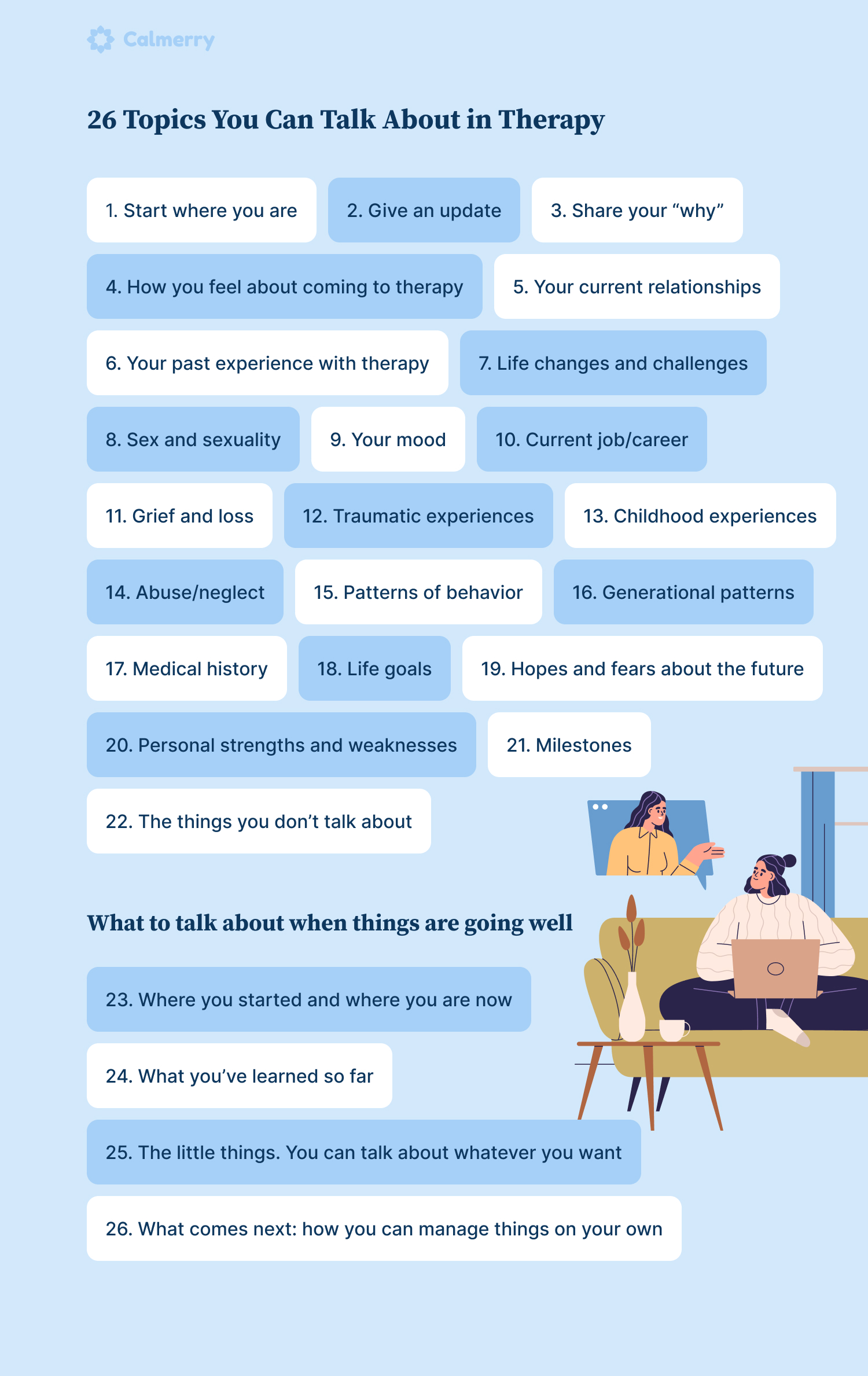At a Loss for Words? 26 Topics You Can Talk About in Therapy

In this article
You’ve made the decision to go to therapy. That’s great! Now, you’re wondering just what to talk about in therapy when the time comes. You know that there are some things you want to explore, but just where do you start?
Some therapists tend to take a structured approach and will guide your sessions. Other therapists prefer to let their clients guide the conversation. Again, depending on your treatment needs, you’ll often find some combination of both approaches.
Despite what you might think, finding things to talk about in therapy isn’t always easy, even if you’ve been in therapy for a while. You know you have things to work on, but still, it can feel like all eyes are on you.
Whether you’re new to therapy or you’ve been in therapy for a while, sometimes a little inspiration can help start the conversation.
What to talk about in therapy?
The short answer is – anything you want to talk about.
It’s your session, and you can choose what to talk to the therapist about. Some days, you may want to vent about an experience you had the day before that triggered all kinds of feelings. Other times, you might want to take a deeper dive into a persistent issue.
Not every session will be the same, nor does it have to be. You might have something specific on your mind. Other times, your therapist might ask you what you’d like to discuss.
If you find yourself struggling with what to share, take a moment to think about what brought you to therapy:
- What do you want to work on?
- What’s on your mind?
- Is there an issue that just lingers?
Sometimes, reflecting on where you are in that moment can inspire you. The good news is that there is no right or wrong place to start the conversation.
1. Start where you are
It sounds almost too easy, but a good place to start is to simply start where you are that day:
- How are you feeling today?
- What has been occupying your thoughts lately?
2. Give an update
If you’re in a follow-up session, sharing an update is a great place to start.
- How have you been since your last session?
- Did you have any experiences that triggered unexpected or uncomfortable thoughts or feelings?
- If you had “homework,” how was that experience?
3. Share your “why”
What prompted you to seek out a therapist?
Was there an “a-ha” moment for you, or have you considered therapy for a while?
Why now?
Exploring your “why” for coming to therapy can help you clarify what you want to explore and guide your journey. It can also help your therapist understand what’s important to you.
– Dr. Dawn Ferrara, PsyD, Licensed Professional Counselor (LPC), and mental health writer
4. How you feel about coming to therapy
Some people come to therapy with many preconceived notions or expectations. Others come with healthy skepticism. Still, others come with high hopes for success.
How do you feel about coming to therapy? It’s ok to talk about it!
5. Your past experience with therapy
If you’ve been in therapy before, you probably have some feelings about the whole process. It’s OK to share the good and the not-so-good with your therapist so that they understand where you’ve been.
What worked for you that you’d like to try again?
Were there things about the experience you didn’t like or don’t want to repeat?
The good news is that every therapy experience is unique. So, even if past experiences weren’t ideal, you can have a successful therapy experience!
Every therapist has their own personality, and there are a lot of ways to address a problem.
Finding the right fit is key. In fact, the therapist-client relationship is one the most important factors in the outcome of therapy.
6. Your current relationships
We have relationships of all kinds in our lives, and they can have an effect on our mental health and sense of well-being.
What are the significant relationships in your life, both the healthy ones and the ones that are more difficult? How do they affect your well-being?
7. Life changes and challenges
Changes and challenges are part of life. Some are welcomed. Some are dreaded. Others are just minor bumps in the road. Still, they all touch our lives in some way.
Marriages, divorces, births, deaths, major moves, school or job changes, illnesses, or just about anything that creates change in your life can rock your world.
What are the significant changes and challenges you’ve experienced? How have they affected you?
8. Sex and sexuality
Yes, you can talk about sex and sexuality in a therapy session. It’s a part of the human experience and can have a profound influence on your mental health and sense of well-being. It’s OK to talk about it all.
Some therapists even specialize in working with issues of sex and sexuality.
9. Your mood
Your mood indicates how you’re feeling at any given time. And it can change over time, too. If you’re experiencing changes in your mood, especially between sessions, it’s important to share that with your therapist.
It helps your therapist be aware of your symptoms, changes over time, and how best to guide you. You don’t just have to talk about any bothersome changes. You can talk about the positive changes you’re noticing too!
– Dr. Dawn Ferrara, PsyD, Licensed Professional Counselor (LPC), and mental health writer
10. Current job/career
Is your job a source of stress, or is it the best thing ever? Are you facing a career change or searching for the right fit?
Maybe you’re having coworker issues. Whatever is happening, jobs and career issues can be the source of a lot of stress in other areas of life, even if you love your job.
Work-life balance has become a big issue for lots of working families. Dealing with it all is a common topic in therapy.
11. Grief and loss
Grief and loss aren’t something we are usually prepared for. For some, it can get complicated and adversely impact mental health.
Have you had a recent loss you can’t seem to move past? Was there a significant loss in the past that remains unresolved?
Sometimes, the impact of a loss doesn’t become apparent until much later. Your session can be a safe space to explore the impact of your loss.
12. Traumatic experiences
Addressing trauma can be hard, even in therapy. You may not even reveal your trauma right away. Many people avoid talking about their trauma because it’s painful, and they don’t want to have to recount every detail. The good news is, you don’t have to.
When you’re ready, you may choose to share a little information at a time. You might tell your therapist that there is something you want to share but are afraid to. A trained trauma therapist can help you unpack your trauma in ways that feel comfortable and safe. And you can talk about as much or as little as feels right to you.
13. Childhood experiences
Childhood experiences profoundly influence physical and mental health throughout our lives.
Adverse Childhood Experiences (ACEs), in particular, can have a negative impact on mental health as we mature into adulthood. But not all childhood experiences are unpleasant.
Our Positive Childhood Experiences (PCEs) can have a positive effect on our physical and mental health and well-being in adulthood.
What experiences did you have that stand out? How do you think they impacted you?
14. Abuse/neglect
These traumatic experiences can be especially difficult to talk about, even in therapy. Avoidance is, in some ways, protective, creating emotional distance between you and the experience. Over time, the emotional load can become overwhelming and keep you from healing. How can you talk about something so private and painful?
When you feel ready, share only what you are comfortable revealing. If the words won’t come, try writing down your thoughts and sharing them with your therapist, or ask them for help to share something hard.

15. Patterns of behavior
You may have noticed that you have ways of coping with certain situations. Some of those patterns may serve you well. Others may not. Sharing your insights with your therapist can help them to better understand your experience and help you find healthy ways of coping for those situations that you find bothersome.
16. Generational patterns
Have you ever caught yourself saying, “I sound just like my mom” or “My dad does the same thing”? If so, you’ve caught a glimpse of the generational patterns we all have.
So much of what we learn about operating in the world is learned at a young age and from our earliest role models – our parents and family. If you take a closer look, you’ll probably find behaviors or patterns that go back generations.
Some generational patterns are awesome and carry a lot of tradition and valuable generational knowledge. Other patterns may not be as useful or helpful. In some cases, they carry the weight of negative behaviors, such as substance abuse.
You may have noticed patterns in your own behavior. It’s okay to share your observations and experiences. You and your therapist can decide whether delving deep into your family of origin would be helpful.
– Dr. Dawn Ferrara, PsyD, Licensed Professional Counselor (LPC), and mental health writer
17. Medical history
It might surprise you to know that your physical health and emotional health are interconnected. Your medical history can be a source of important information needed to guide your treatment.
Positive mental well-being has been shown to have a positive impact on physical health and may reduce the risk of things like heart attacks and strokes. Poor mental health has been linked to many health issues. For example, depression has been linked to chronic illnesses, including stroke, heart disease, chronic pain, and diabetes.
Conversely, physical illness may lead to mental health issues such as increased stress and anxiety, poor sleep, and depression. It’s estimated that about one-third of people diagnosed with a serious medical condition will also experience some symptoms of depression.
– Dr. Dawn Ferrara, PsyD, Licensed Professional Counselor (LPC), and mental health writer
18. Life goals
When you think about your future, what do you wish for yourself? Where do you want to go? Some people seek therapy to help them clarify just where they want to go. Others have an idea but no clear plan or path for getting there. Sharing your life goals with your therapist can lend insight into your goals and aid in setting treatment goals that can help move you in the direction you want to go.
19. Hopes and fears about the future
Our hopes and fears have a profound influence on where we go or what we do. Hopes are things that you desire to happen. Hopeful thinking is based on realistic optimism and a plan for reaching your goal. Are you optimistic that your hopes can be achieved, or are you more pessimistic?
Fear is a powerful, unpleasant emotion caused by the anticipation or the perception of danger. Of course, fear can be a healthy response when danger is lurking. True fear protects you from danger and could literally save your life. It’s the kind of fear that keeps you from touching fire.
Fear can also hold you back. These are the fears that are rooted in our thoughts and imagination, the “what ifs” and worries we have about what could or might happen. These fears create a lot of stress and anxiety and can keep you from doing the things you want or need to do. Sharing your hopes and fears can yield powerful insights into your triumphs and your struggles.
20. Personal strengths and weaknesses
Every person has a unique set of strengths and weaknesses but probably don’t give them a lot of thought. Weaknesses are vulnerabilities that can get in the way of progress. On the flip side, your strengths are those qualities and abilities that you can draw upon to manage issues that arise.
For example, you might struggle with expressing your feelings but have a great capacity for empathy for others. That’s a strength that you may be able to draw upon as you learn how to express yourself.
In your initial assessment, your therapist might ask about your strengths and weaknesses. As you progress in therapy, you may discover additional strengths or needs. Sharing those new discoveries can help you progress in your journey.
21. Milestones
You might not think that milestones can be important to share in therapy, but they are part of your story. They are markers of sorts of things you’ve accomplished in life so far. Milestones are events or experiences that hold tremendous meaning in your life.
What milestones have you reached, and what did that mean to you? Are there other milestones that you are excited or concerned about?
Understanding milestones and their meaning can help guide you on your path as you set your goals and move forward.
22. The things you don’t talk about
Of all the things you could talk about, there are probably things that you guard and protect too. You just don’t talk about them. They might just be the things you need to talk about most. Now, just blurting these topics out isn’t likely to happen, and that’s ok. Most people don’t tell their therapist their deepest secrets right away.
What you can do is be open with your therapist and let them know there are some hard things that you want to be able to talk about but don’t feel quite ready for. If there is something your therapist can do to support you in sharing, it’s ok to ask for what you need.
For example, “There’s something hard I want to share. It would help me if you could support me by…”. They can help you from there and move towards talking about those deeper issues.
When you’re struggling with what to talk about in therapy when you have nothing, or it just won’t come, one of these therapy topics might just open a dialogue that brings you to a new place of insight and growth.
What to talk about when things are going well
Sometimes, things are going really well in therapy. You’re making progress and feeling stronger. Knowing what to talk about when things are going good is hard because, well, you’re feeling well, and the problems that brought you to therapy might seem small or are improving. You might even start to think you’re done. Not so fast.
Instead, use this time in therapy to reflect on where you’ve been in your journey so far and what your next steps might be. If you’re still learning and growing, you may not be quite done yet but rather poised for the next steps.
Here are a few topics that might help you explore this place you find yourself in:
23. Where you started and where you are now
Sometimes the realization that things are getting better takes you by surprise. This is a great time to take time to reflect on where you’ve been and where you find yourself now.
Check in with how you’re feeling about the journey so far. What’s different now? Talk about the positive changes and breakthroughs you’ve had.
Also, take time to share the things you’re still working on. Have new issues arisen since you first started?
24. What you’ve learned so far
Part of therapy is learning new coping skills and changing patterns of behavior. Take some time to think about what you’ve learned about yourself and the positive changes you’ve made.
Maybe you’ve gained new communication skills or learned healthy ways of managing your anxiety.
What impact has that had on your sense of well-being? How has this affected other parts of your life (relationships, school, work)?
25. The little things
Even though you work hard in therapy, every session doesn’t have to be about the hard stuff. You can talk about whatever you want.
Sometimes, it’s the little things – the everyday annoyances – that create stress and frustration, and you might come to the session with something on your mind.
Maybe it’s a spat you had with mom or a date that didn’t turn out as you expected, or a work issue that popped up last minute. Sometimes, you just need to talk it out. Your session can be a great space for that, too, because life happens.
26. What comes next
This is a great time to talk about what comes next. Therapy has a beginning, a middle, and an end. The goal of therapy, besides helping you to heal and grow in the ways you desire, is for you to eventually be able to manage things on your own.
Knowing when that time comes is not written in stone, and there is no timetable for beginning or ending therapy. Sometimes when it feels like you’re in a good place or you feel like you’re not getting as much out of your sessions, it can feel like an ending, but it might simply be an indicator that it’s time for a change.
That change doesn’t mean you have to abruptly stop therapy. On the contrary, it could mean that you’re becoming better at using what you’ve learned and that you might not need to see your therapist quite as often.
– Dr. Dawn Ferrara, PsyD, Licensed Professional Counselor (LPC), and mental health writer
Talk with your therapist about spacing out your sessions. Maybe you can move from weekly sessions to every other week or even once a month. Gradually spacing out your sessions gives you time to use what you’re learning but still have the comfort of knowing your therapist is still there to guide you.
Silence is therapeutic, too
Sometimes you’ll encounter moments of silence in your sessions. Yes, those awkward silent pauses can be uncomfortable. You sit there, waiting for your therapist to say something. Why don’t they say anything?
Your therapist is quiet for a reason: some of the most profound insights in therapy come from moments of silence. Part of therapy is finding your own insights and solutions. Silence facilitates introspection and awareness of your thoughts and feelings. As these come up, you may choose to explore them.
Don’t feel like you have to fill every empty space with talking. Don’t be afraid of the silence. Give yourself permission to sit in silence for a few moments and see what comes up for you.
A word from Calmerry
The fact is, talk therapy is a two-way process that will ebb and flow. Sometimes there are awkward silences. Sometimes people struggle to find the words. Other times the conversation flows effortlessly.
Above all, take your time. It’s all OK, and it all has meaning and value.
This is where the unique support provided by Calmerry can make a significant difference, with a safe space for these nuances in the therapeutic journey.
If you’re looking for a compassionate therapist, we can match you with them within 1 hour. Start with a brief survey, where you can indicate all your preferences and needs.
online therapy
live video session



